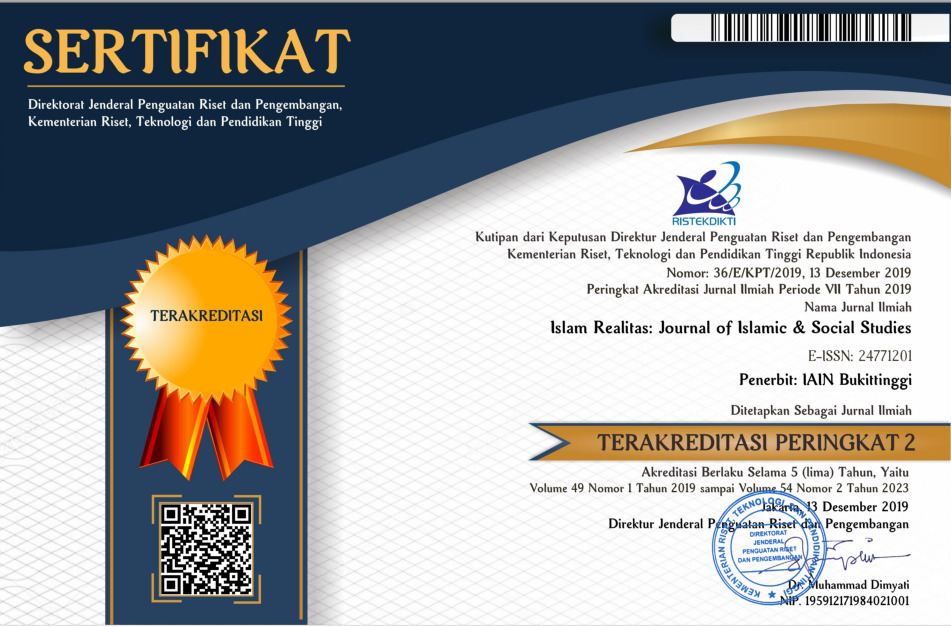Perilaku Hidup Konsumtif Remaja Muslim di Pilar Coffee Bukittinggi
DOI:
https://doi.org/10.30983/fuaduna.v3i2.888Abstract
Currently among Muslim youth there has been a shift in shopping behavior to coffeshop. Muslim youths are looking for excessive entertainment because they tend to follow models of today's development. The presence of the coffeshop has an impact on the consumptive behavior of Muslim teenagers. Based on the participation observation that there is a relationship between the existence of coffeshop to consumptive behavior of Muslim teenagers. Based on the results of the analysis of Islamic economic view that the behavior of consumptive Muslim teenagers is not in accordance with the behavior in consumption in Islamic economics which refers to the three basic principles of consumption that has been outlined by Islam is kosher consumption, consumption of sacred goods and not excessive. Consumption of Muslim teenagers is included in the category of consumptive behavior.
References
Hipni, Mohammad. “The Study of Maqashidi Sharia Toward Maduresse Traditional Inheritance by Using System Approach.†AL-IHKAM: Jurnal Hukum & Pranata Sosial 14, no. 1 (June 30, 2019): 50. doi:10.19105/al-ihkam.v14i1.2159.
Ismail, Ismail. “Eksistensi Ushul Fiqh Dalam Tafsir Realitas Sosial Dan Peranan Pesantren Dalam Menjaga Dan Mengembangkannya.†Alhurriyah: jurnal hukum islam (alhurriyah journal of islamic law) 4, no. 1 (June 30, 2019): 1. doi:10.30983/alhurriyah.v4i1.1264.
Jafar, Wahyu Abdul. “Eksistensi Wakaf Tunai Dalam Tinjauan Maslahah Mursalah.†Alhurriyah: Jurnal Hukum Islam (Alhurriyah Journal of Islamic Law) 4, no. 1 (June 30, 2019): 21. doi:10.30983/alhurriyah.v4i1.817.
Jau-Jia Guo, and P.B. Luh. “Selecting Input Factors for Clusters of Gaussian Radial Basis Function Networks to Improve Market Clearing Price Prediction.†IEEE Transactions on Power Systems 18, no. 2 (May 2003): 665–72. doi:10.1109/TPWRS.2003.811012.
Kurniawan, Ardietya, and Muh Rosyid Ridlo. “Perilaku Konsumtif Remaja Penikmat Warung Kopi.†DILEMA 32, no. 1 (April 29, 2017): 9–22. https://jurnal.uns.ac.id/dilema/article/view/11232/pdf.
Mohiuddin, A. K. “Lifestyle Issues and Prevention of Recurrent UTIs.†International Research in Medical and Health Science 2, no. 4 (September 4, 2019): 73–82. doi:10.36437/irmhs.2019.2.4.S.
Rittiboonchai, Wisit, Penpicha Kriwuttisom, and Thi Minh Trang Ngo. “Factors Affecting Online Shopping Behavior Of Thaiand Vietnamese Female Students.†RMUTT Global Business Accounting and Finance Review 2, no. 2 (January 4, 2019). http://www.journal.rmutt.ac.th/index.php/gbafr/article/view/1240.
Saura, Jose Ramon, Pedro Palos-Sanchez, and Antonio Grilo. “Detecting Indicators for Startup Business Success: Sentiment Analysis Using Text Data Mining.†Sustainability 11, no. 3 (February 11, 2019): 917. doi:10.3390/su11030917.
Shan, Chenyu, Dragon Yongjun Tang, and Andrew Winton. “Do Banks Still Monitor When There Is a Market for Credit Protection?†Journal of Accounting and Economics 68, no. 2–3 (November 1, 2019): 101241. doi:10.1016/J.JACCECO.2019.101241.
Strumpel, Burkhard, Ed. “Economic Means for Human Needs: Social Indicators of Well-Being and Discontent.†Survey Research Center, Institute for Social Research, University of Michigan, Ann Arbor, Michigan 48106 ($14.00 clothbound), 1976. https://eric.ed.gov/?id=ED129646.
Soekanto, Soerjono. 1990. Sosiologi suatu Pengantar. Jakarta: Raja Grafindo Persada.
Downloads
Published
How to Cite
Issue
Section
Citation Check
License
Authors who publish with this journal agree to the following terms:
- Authors retain copyright and grant the journal right of first publication with the work simultaneously licensed under a Creative Commons Attribution-ShareAlike 4.0. that allows others to share the work with an acknowledgment of the work's authorship and initial publication in this journal.
- Authors are able to enter into separate, additional contractual arrangements for the non-exclusive distribution of the journal's published version of the work (e.g., post it to an institutional repository or publish it in a book), with an acknowledgment of its initial publication in this journal.
- Authors are permitted and encouraged to post their work online (e.g., in institutional repositories or on their website) prior to and during the submission process, as it can lead to productive exchanges, as well as earlier and greater citation of published work (See The Effect of Open Access).





